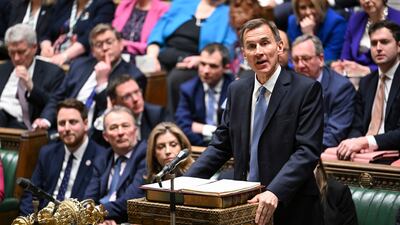As Jeremy Hunt stood up to deliver his budget on Wednesday afternoon, he did so against the background of the highest inflation level in decades, rising borrowing costs, a cost-of-living crisis and widespread strikes.
One of the biggest surprises was the forecast by the Office for Budget Responsibility that the UK would avoid a technical recession this year and that inflation would fall to 2.9 per cent by the end of 2023.
For months, economists have been predicting a shallow recession at some point this year, as defined by two consecutive quarters of negative growth.
Also, the rate of inflation was not expected to drop to about 2.9 per cent until some point in 2024.
Whether both those things will happen is a matter for debate, economists said.
“Jeremy Hunt wasted no chances in pulling the biggest rabbit from his hat, brandishing the forecast from the Office for Budget Responsibility that the UK will swerve a recession this year,” said Susannah Street, head of money and markets at Hargreaves Lansdown.
“Things were already looking up, with consumer and business confidence rising, and spending proving much more resilient.
“But given that the cost-of-living crisis is still proving painful, economic activity is still likely to be slow to power up and a period of stagflation not supercharged growth is still expected.
“The Chancellor is gearing up to deliver fresh incentives to loosen a tight labour market, spark greater productivity and bring in foreign investment but it’s going to still be a hard slog ahead.”
Nonetheless, Kitty Ussher, chief economist at the Institute of Directors, said businesses will be reassured by the OBR forecasts.
“It’s also hugely encouraging that they felt able to lift further their assessment of Britain’s growth potential as a direct result of supply-side policy decisions announced today; this is evidence-based policy-making at its best,” she said.
While the drop will be lower than previously expected, real households' disposable income per person will tumble 5.7 per cent.
Households will therefore feel the pinch more than at any point since 1957, according to the OBR.

Give and take
Businesses really did not want to see the rise in corporation tax from 19 per cent to 25 per cent, but were fairly resigned to it as long as there was a trade-off.
The trade-off was a successor to the super-deduction scheme, through which companies could set 130 per cent of capital expenditure against tax, which will come to an end at the start of April.
The Confederation of British Industry had urged the Chancellor to replace it with “full capital expensing”, by which firms can claim tax relief on 100 per cent of their capital spending.
Mr Hunt delivered that, saying he could not let the super-deduction scheme fall away without a replacement that would keep the UK competitive.
“So today, I can announce that we will introduce a new policy of 'full expensing' for the next three years, with an intention to make it permanent as soon as we can responsibly do so,” he said. He added that the policy is effectively a £9 billion tax cut for businesses.
Matthew Fell, interim director general at the CBI, said: “Full capital expensing will keep the UK at the top table for attracting investment and puts us on an essential path to a more productive economy.
Fiona Graham, director of policy and external affairs at the Institute for Family Business, said: “We are extremely pleased the Chancellor listened to our calls over the past year to introduce a Full Expensing programme.
“We welcome the Chancellor’s intention to make that regime permanent.
“With so much change over recent years, we need confirmation of this intention as soon as possible to give businesses certainty on the long-term tax landscape.”
But others were less enthusiastic.
Danni Hewson, head of financial analysis at AJ Bell, pointed out that while full expensing makes for a good headline, “it replaces the super deduction which at 130 per cent was a tad more generous”.
“Businesses are also having to factor in the increase in corporation tax, so it feels a bit like they’ve been short-changed on this one.”

Back to work
One of the pillars of Mr Hunt's “budget for growth” was getting various groups back into work.
The main incentives were expanded childcare for parents with young children and those over-50s who have taken, or are thinking of taking, early retirement.
Mr Hunt promised up to 30 hours per week of free childcare for eligible households in England for children as young as nine months, instead of only three and four-year-old children under the current policy.
“I don’t want any parent with a child under five to be prevented from working, if they want to, because it is damaging to our economy and unfair, mainly to women,” he said.
“It’s a package worth on average £6,500 every year for a family with a two-year-old child using 35 hours of childcare every week, and reduces their childcare costs by nearly 60 per cent.”
Mr Fell of the CBI said: “Boosting childcare provision is a big win for businesses struggling to recruit and retain, and parents balancing care and career needs.”
However, there was a cautious welcome to this among analysts.
It could “transform the finances of parents” and deter them from fleeing the workforce, because the “the cost of childcare is so painful”, said Susannah Streeter at Hargreaves Lansdown.
However, to make his childcare policy happen, staffing ratios at nurseries are being cut from one adult to four children to one adult to five children. There will also be a £600 sign-on bonuses for new childcare workers.
“It remains to be seen whether this will be enough to enable nurseries to offer the places at a profit, but on the face of it look like positive steps,” Ms Streeter said.
Others pointed out that the childcare changes are complicated and will take years to fully be enacted.
“The support will be rolled out slowly so not everyone can instantly access the full 30 hours plus it will generally only apply within term time and to households where both parents work,” said Alice Haine, personal finance analyst at Bestinvest.
Meanwhile, Mr Hunt's plans to retain older workers in the labour market and entice back those who have taken early retirement was also revealed in the budget speech.
He increased the pensions annual tax-free allowance by 50 per cent from £40,000 to £60,000 and got rid of the lifetime allowance, which had a limit of £1 million, completely.
The move was met with some cynicism — most people never get that close to those pension caps.
But the move is aimed at highly skilled and highly paid professionals, and while Mr Hunt did say that it was not only aimed at doctors, he does not “want any doctor to retire early because of the way pension taxes work”.
“Losing over-50s from the workforce is nothing less than a tragedy, and I’m glad the Chancellor has recognised the value this generation can bring to the economy,” said Nick Sanderson, chief executive of retirement village builder Audley Group.
Many were impressed that the Chancellor had, at a stoke, removed the lifetime allowance.
“This much-maligned rule has been a check on investment performance and its removal is extremely welcome,” said Helen Morrissey, head of retirement analysis at Hargreaves Lansdown.
“These changes bring a breath of fresh air to retirement planning that had been hugely complicated by the presence of restrictions on how much you can contribute and how much you can accumulate in a pension.
“At one stroke, the Chancellor has simplified the pension system for everyone, not just higher earners.”
Energy relief or not
While the Chancellor announced an extension of the Energy Price Guarantee, which caps typical household energy bills at £2,500, there was precious little in the budget that would help businesses with their soaring energy costs.
“Almost half of businesses have told us they will struggle to pay their energy bills from April, and they cannot invest when they are fighting to survive,” said Shevaun Haviland, director general of the British Chambers of Commerce.
“There is little in today's announcement that will provide comfort to these firms.”
Martin McTague, national chairman of the Federation of Small Businesses, said small firms had been left feeling “short-changed”.
“We've got a budget that on energy helps households but not small firms,” he said.
Michelle Ovens, founder of Small Business Britain, said more needed to be done to help Britain's 5.5 million small companies now, rather later.
“This budget is optimistic for the future, but many businesses will be wondering if they will still be around to benefit from it,” she warned.
'Lacking oomph'
For some analysts, the Chancellor is sailing close to the wind with this budget. He has left himself only £6.5 billion of headroom, which may sound like a large sum, but it is actually the smallest amount that any Chancellor has left himself since the OBR was created 13 years ago.
“Any small adverse changes to the forecast or unforeseen economic shocks could see the Chancellor scrambling to meet his target to have debt falling as a percentage of GDP [gross domestic product] in five years’ time, which would likely mean tax rises or public spending cuts in the medium term,” said Laith Khalaf, head of investment analysis at AJ Bell.
Overall, as is usually the case, views on the budget differ radically.
Looking at the FTSE 250 index of mid-cap shares, one could conclude the market was relatively neutral on Mr Hunt's speech.
Before the budget speech got under way, the FTSE 250 had fallen from 19,129 to 18,552, but it managed to recover to 18,602 by the time Mr Hunt was finished.
Most analysts feel Mr Hunt was not aiming for fireworks with his budget — no big tax giveaways. Some feel he is saving those up for next year, which will probably be only months away from a general election.
“This was billed as a boring budget,” said Danni Hewson, head of financial analysis at AJ Bell.
“It wasn’t that, but it also lacked a degree of oomph which business leaders had been calling for.”


